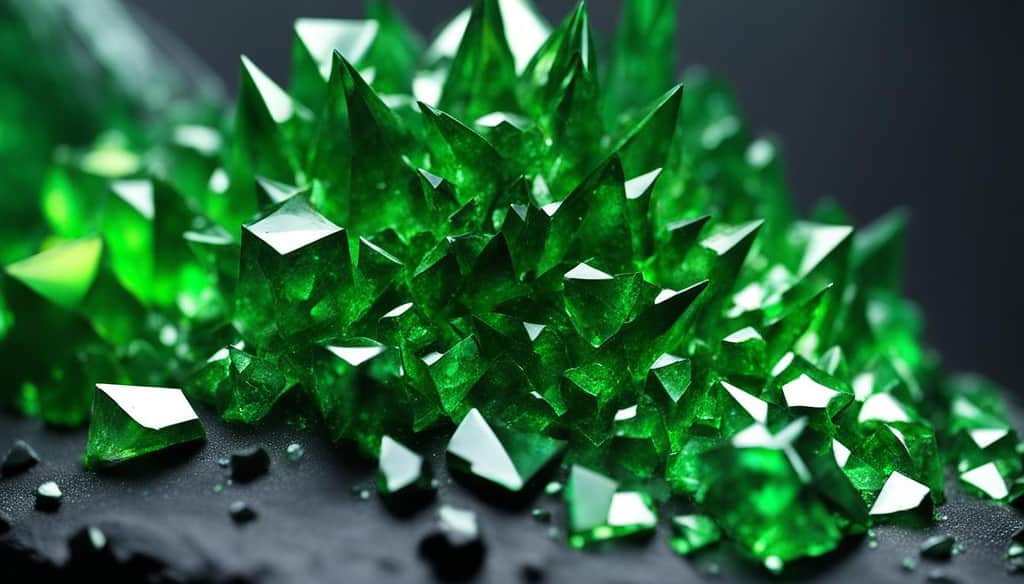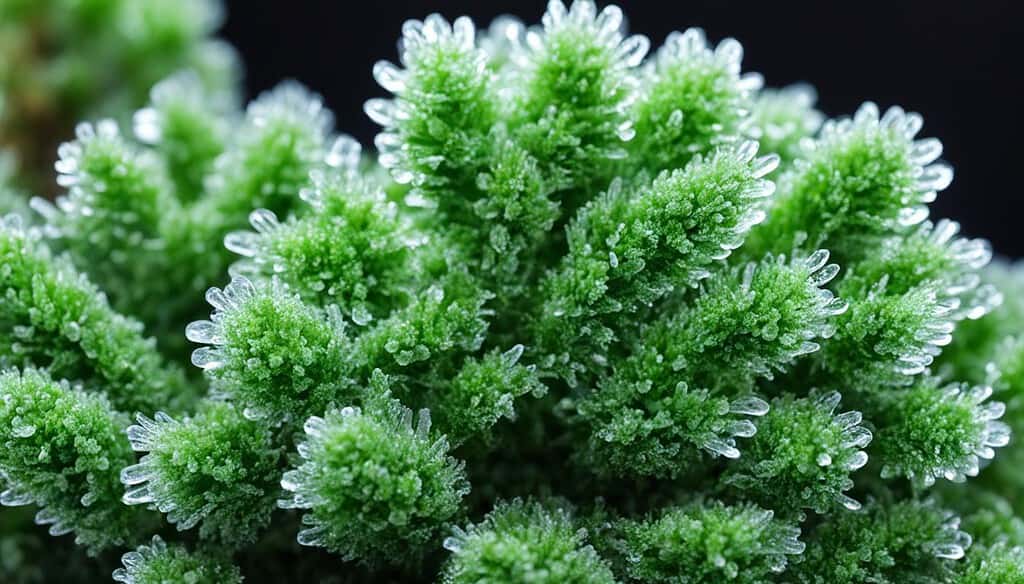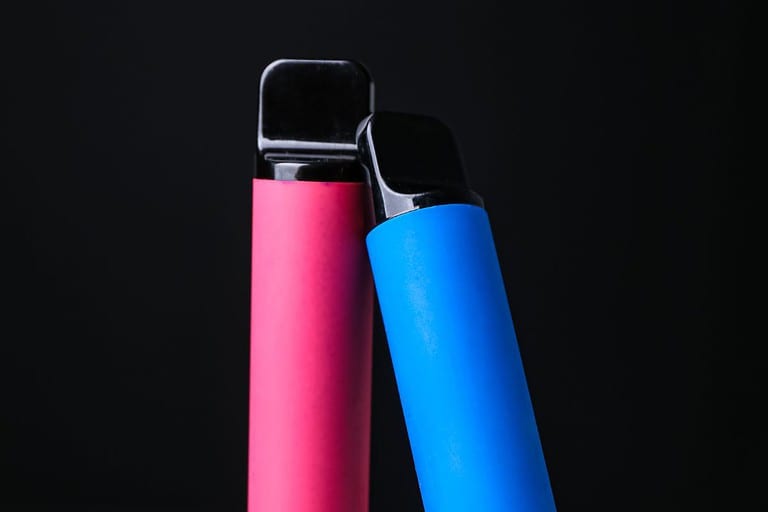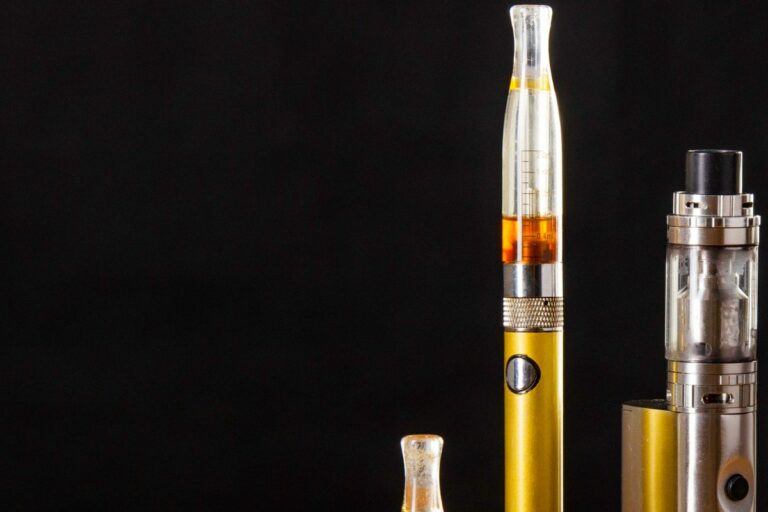THCA Side Effects: Potential Risks & Impacts
Welcome to our article on THCA side effects and health risks. THCA, or tetrahydrocannabinolic acid, is a naturally occurring cannabinoid found in raw cannabis buds. While it doesn’t produce psychoactive effects on its own, when heated or smoked, it converts into THC, the compound responsible for the altered sensations commonly associated with cannabis use.
Understanding the potential risks and impacts of using THCA is essential for making informed decisions about its consumption. In this article, we will explore the effects of heating or smoking THCA, the legal implications of its use, potential side effects, the dangers of unregulated THCA products, and how to get help for THCA abuse.
Let’s dive in and discover everything you need to know about THCA and its side effects.
Table of Contents
What Happens When THCa Is Heated or Smoked?
When THCa is heated or decarboxylated, it undergoes a chemical change and transforms into THC. This converted form of THCa is psychoactive and can produce a range of effects. Some of the common effects of THC include:
- Euphoria: THC can induce feelings of happiness, relaxation, and well-being.
- Altered perception: THC can affect sensory perception, making colors appear more vivid or distorting the perception of time.
- Impaired memory and cognition: THC can temporarily impair short-term memory and cognitive function.
- Dry mouth: Commonly known as “cottonmouth,” THC can cause a dry sensation in the mouth.
- Increased heart rate: THC can elevate heart rate, which may be a concern for individuals with cardiovascular conditions.
- Anxiety: In some cases, THC can induce feelings of anxiety or paranoia, particularly at higher doses or in individuals sensitive to its effects.
The intensity and duration of these effects can vary depending on factors such as dosage, individual sensitivity, and strain potency. It’s important to note that the effects of THC can be both positive and negative, and individual responses may vary.
“When THCa is heated or smoked, it undergoes a chemical transformation, becoming psychoactive THC. This conversion leads to various effects, including euphoria, altered perception, impaired memory, dry mouth, increased heart rate, and potential anxiety. The intensity and duration of these effects depend on factors such as dosage, individual sensitivity, and strain potency.”
Is THCa Legal to Use?
While THCa is legal at the federal level as long as it meets the acceptable delta-9 THC threshold of 0.3%, it’s essential to consider state laws and their interpretations of hemp laws. This ensures the legality of THCa use in specific jurisdictions. However, the use of unregulated THCa products raises safety concerns and potential side effects.
Unregulated THCa products lack standardized testing for potency and quality control, making it difficult for consumers to gauge their safety and effectiveness. These products may also be contaminated with pesticides and other harmful chemicals, posing risks to users’ health. It’s crucial to exercise caution and prioritize using regulated THCa products that adhere to proper testing and safety standards.
Safety Concerns of Unregulated THCa
Using unregulated THCa products can create safety hazards due to the lack of quality control and oversight. These products may have inconsistent potency levels, leading to unpredictable effects and potentially higher risks of side effects. Additionally, the lack of proper labeling and information makes it challenging for consumers to understand dosage guidelines and anticipate potential adverse reactions.
Unregulated THCa products may be contaminated with pesticides, heavy metals, and other harmful substances, which can have detrimental effects on users’ overall health and well-being.
Consumers who prioritize their safety and well-being should be cautious when using unregulated THCa products. Seeking out reputable brands and products that undergo standardized testing for potency, quality, and safety ensures a more controlled and reliable user experience.
The Legal Implications
While THCa may be legal at the federal level, state laws regarding its use can vary. Some states adhere strictly to the delta-9 THC threshold, while others interpret hemp laws differently, allowing legal use of THCa products. It is crucial to stay informed about local and state regulations to determine the legality of THCa in specific jurisdictions.
| Legal Status | Description |
|---|---|
| Legal | THCa products that meet federal and state guidelines regarding THC content. |
| Illegal | THCa products that exceed federal or state delta-9 THC limits. |
| Not Regulated | THCa products that fall outside the scope of federal and state regulations, their legality may not be defined or enforced. |
Understanding the legal implications surrounding THCa use is essential for individuals looking to incorporate it into their wellness routines or medicinal treatments. Consulting with local legal authorities or professionals knowledgeable about cannabis laws in your area can provide accurate guidance regarding THCa’s legal status.
THCa Side Effects
While THCA on its own is not known to cause intoxication or psychoactive effects, it is important to be aware of the potential side effects associated with consuming raw THCA or products made from it.
- Nausea: Raw THCA consumption can sometimes result in feelings of nausea.
- Indigestion: Some individuals may experience indigestion after ingesting THCA.
- Allergic Reactions: Similar to other plant-based compounds, THCA may trigger allergic reactions in certain individuals.
- Unwanted Drug Interactions: THCA has the potential to interact with prescription medications, leading to unforeseen effects.
The main risk of THCA arises when it is heated or vaped, causing it to convert into THC. This conversion can result in the short-term side effects typically associated with THC usage, such as:
- Euphoria
- Altered perception
- Impaired memory and cognition
- Dry mouth
- Increased heart rate
- Anxiety
It’s essential to note that long-term THC usage, particularly in high potency, has been linked to a range of adverse effects, including addiction, respiratory issues, and mental health conditions.
Expert Insight:
“While THCA on its own doesn’t typically produce psychoactive effects, caution should be exercised when consuming products containing THCA. The conversion of THCA into THC through heating or vaping carries potential short-term side effects that should not be ignored. Additionally, long-term THC usage can have serious implications on both physical and mental well-being.” – Dr. Sarah Johnson, Cannabis Researcher.
To visualize the conversion of THCA to THC, refer to the image below:
Dangers of Unregulated THCa
Unregulated THCa products sold online can pose several risks to consumers. These products may lack consistent potency and be contaminated with pesticides, heavy metals, and other harmful substances. The lack of proper labeling and information makes it difficult for consumers to make informed decisions about dosage and potential side effects.
Additionally, using unregulated THCa products may have legal implications and lack the consumer protection provided by regulated marketplaces, including the ability to report adverse reactions and seek compensation for losses.
Risks of Unregulated THCa
| Dangers of Unregulated THCa | Potential Consequences |
|---|---|
| Lack of Consistent Potency | Consumers may not know the exact strength of the THCa they are consuming, potentially leading to unintended effects or inadequate therapeutic outcomes. |
| Pesticide and Heavy Metal Contamination | Unregulated products may contain harmful substances due to the lack of quality control measures, posing health risks to consumers. |
| Lack of Labeling and Information | Without proper labeling and information, consumers cannot make informed decisions about dosage, potential side effects, or drug interactions. |
| Legal Implications | Unregulated THCa products may be illegal in certain jurisdictions, exposing consumers to legal consequences. |
| Lack of Consumer Protection | Regulated marketplaces provide avenues for consumers to report adverse reactions, seek compensation for losses, and hold manufacturers accountable for product quality. |
Getting Help for THCa Abuse
Recognizing the signs of THCa abuse is crucial in helping loved ones struggling with addiction. Look out for symptoms such as:
- Euphoria
- Mood changes
- Altered sensory perception
- Dry mouth
- Elevated heart rate
If you suspect someone is abusing THCa, it’s important to encourage them to seek professional help. Treatment options for THCa abuse may involve:
- Individual therapy sessions
- Group therapy sessions
- Addressing underlying mental health issues through co-occurring disorder treatment
By engaging in personalized treatment programs, individuals struggling with THCa abuse can receive the necessary support to overcome addiction and achieve long-lasting recovery.
| Treatment Options for THCa Abuse | Benefits |
|---|---|
| Individual therapy sessions | Provide a safe space for individuals to explore underlying issues leading to THCa abuse. |
| Group therapy sessions | Offer peer support and a sense of community, helping individuals feel understood and less alone. |
| Co-occurring disorder treatment | Address any underlying mental health conditions that may contribute to THCa abuse, promoting holistic healing. |
Getting professional help is essential for individuals struggling with THCa abuse to regain control over their lives and achieve a healthier, substance-free future.
What is THCa?

THCa, or tetrahydrocannabinolic acid, is a non-psychoactive cannabinoid found in live cannabis plants. It serves as the precursor to THC, the compound responsible for the psychoactive effects commonly associated with cannabis use. In its raw form, THCa does not produce any psychoactive effects.
When cannabis is heated or undergoes a process called decarboxylation, THCa converts into THC. This chemical transformation unlocks the psychoactive properties of THC, leading to the altered mood, perception, and sensory experiences often associated with cannabis consumption.
| THCa | THC |
|---|---|
| Non-psychoactive | Psychoactive |
| Raw form | Converted form |
| Found in live cannabis plants | Produced through decarboxylation |
THCa vs. THC: Strength & Effects
THCa, also known as tetrahydrocannabinolic acid, is distinct from THC in terms of potency and effects. While THC is renowned for its psychoactive properties, THCa has minimal noticeable effects. Let’s explore the differences between THCa and THC in terms of strength and their impact on the body.
THC: Potency and Effects
THC, or delta-9-tetrahydrocannabinol, is the primary psychoactive compound in cannabis. It is responsible for the euphoria, relaxation, altered perception, heightened senses, increased appetite, and potentially sedative effects associated with cannabis consumption.
“THC is known for its euphoric and mind-altering qualities, often leading to a ‘high’ sensation.”
THC interacts with the endocannabinoid receptors in the brain, affecting various cognitive and physiological processes. The strength of THC can vary depending on factors such as the strain, dosage, method of consumption, and individual tolerance.
THCa: Minimal Noticeable Effects
Unlike THC, THCa does not possess significant psychoactive properties. THCa is the raw, acidic form of THC that exists in live cannabis plants. It only converts into THC through a process called decarboxylation, which typically occurs when cannabis is exposed to heat or light.
As a non-psychoactive precursor to THC, THCa has minimal effects on the mind and body. However, some users report experiencing mental calming and relaxation when consuming THCa-rich products. Additionally, THCa is being studied for its potential anti-inflammatory properties and therapeutic applications.
Comparison of THCa and THC
| THCa | THC |
|---|---|
| No psychoactive effects | Psychoactive effects, including euphoria and altered perception |
| May contribute to mental calming | Can induce relaxation, euphoria, and heightened senses |
| Raw form found in live cannabis plants | Produced through decarboxylation of THCa |
While THC is known for its potent psychoactive effects, THCa offers a milder experience characterized by mental calming and relaxation. Understanding these differences can help individuals make informed decisions about their cannabis consumption based on their desired effects, whether therapeutic or recreational.
By knowing the distinctions between THCa and THC, individuals can tailor their cannabis experience to their preferences, needs, and goals, whether seeking psychoactive effects or simply enjoying the potential therapeutic benefits of THCa.
Benefits of THCa

Research suggests that THCa may have various therapeutic benefits, including:
- Relaxation: THCa may help promote relaxation and reduce stress levels.
- Anti-inflammatory effects in inflammatory bowel diseases: THCa shows promise in reducing inflammation associated with conditions like Crohn’s disease and ulcerative colitis.
- Neuroprotective properties for conditions like Huntington’s disease: THCa may have neuroprotective effects, potentially benefiting individuals with neurodegenerative disorders like Huntington’s disease.
- Potential for reducing seizures: THCa has shown potential in reducing the frequency and severity of seizures in certain seizure disorders, although more research is needed to confirm its effectiveness.
While these findings are promising, it’s essential to note that more research is needed to fully understand and validate these potential benefits of THCa.
Table: Comparing Potential Benefits of THCa
| Benefit | Potential |
|---|---|
| Relaxation | ✓ |
| Anti-inflammatory effects in inflammatory bowel diseases | ✓ |
| Neuroprotective properties for conditions like Huntington’s disease | ✓ |
| Potential for reducing seizures | ✓ |
More research is needed to fully understand and validate the potential benefits of THCa.
Conclusion
THCA, a naturally occurring cannabinoid found in raw cannabis, undergoes a chemical change to become psychoactive THC. It is important to be aware of the potential side effects, benefits, and uses of THCA when considering its usage. By understanding the risks and impacts of THCA side effects, individuals can make informed decisions about its consumption.
Using regulated THCA products is crucial for ensuring safety and minimizing the potential risks associated with unregulated substances. Additionally, seeking professional help and support is essential in addressing any issues related to THCA abuse and addiction.
Further research is needed to fully explore the therapeutic potential of THCA, as it shows promise in various areas such as relaxation, anti-inflammatory effects, neuroprotection, and seizure reduction. Continued scientific investigation will provide valuable insights into the benefits and limitations of THCA, ultimately helping individuals make informed choices about its use.
FAQ
What are the potential side effects of THCA?
When THCA is heated or decarboxylated, it converts into THC and can produce effects such as euphoria, altered perception, impaired memory and cognition, dry mouth, increased heart rate, and anxiety.
What happens when THCa is heated or smoked?
Heating or smoking THCa converts it into THC, which is psychoactive and can cause a variety of effects such as altered sensations, poor physical mobility, and hallucinations.
Is THCa legal to use?
THCa is legal at the federal level as long as it meets the acceptable delta-9 THC threshold of 0.3%. However, state laws may vary, and some jurisdictions may have different interpretations of hemp laws, allowing for the legal use of THCa.
What are the potential side effects of THCa?
Consuming raw THCa or products made from it can lead to side effects such as nausea, indigestion, allergic reactions, and unwanted drug interactions with prescription medications. Heating or vaping THCa can convert it into THC and result in short-term side effects like euphoria, altered perception, dry mouth, and increased heart rate.
What are the dangers of unregulated THCa?
Unregulated THCa products sold online can pose risks to consumers. These products may lack consistent potency, be contaminated with harmful substances like pesticides and heavy metals, and have inadequate labeling and information, making it difficult for consumers to make informed decisions.
How can I get help for THCa abuse?
Treatment options for THCa abuse include personalized programs that may involve individual and group therapy, as well as addressing any underlying mental health issues through co-occurring disorder treatment.
What is THCa?
THCa, or tetrahydrocannabinolic acid, is a non-psychoactive cannabinoid and the precursor to THC. In its raw form, THCa does not produce psychoactive effects.
What is the difference between THCa and THC in terms of strength and effects?
THCa is less potent than THC and does not produce the same psychoactive effects. THC is known for its euphoria, relaxation, altered perception, and increased appetite, while THCa has minimal noticeable effects. THCa may contribute to mental calming and relaxation without the psychoactive properties of THC.
What are the benefits of THCa?
Research suggests that THCa may have various therapeutic benefits, including relaxation, anti-inflammatory effects in inflammatory bowel diseases, neuroprotective properties for conditions like Huntington’s disease, and potential for reducing seizures. However, more research is needed to fully understand and validate these potential benefits.
What are the overall risks and impacts of THCA side effects?
It is important to be aware of the potential risks and impacts of THCA side effects, including short-term effects like altered perception and increased heart rate, as well as long-term risks associated with high potency THC usage, such as addiction, respiratory issues, and mental health conditions.







